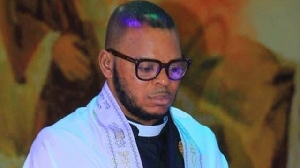Abipotia(ER), Jan.13, GNA-The Presbyterian Church of Ghana (PCG), has instituted legal action against the Kwahu West Municipal Assembly at the Nkawkaw High Court.
The Church took the action following a technical advice the assembly gave towards the construction of a place of convenience on PCG's acquired land for the Abipotia community and the Municipal Assembly Junior High School without consulting it.
The six-seater septic tank place of convenience was constructed by the New Apostolic Church at the cost of GH¢ 6,800 to solve the sanitation problem in the community.
The Municipal Chief Executive (MCE), Mr Alex Somuah Obeng, disclosed this at the inauguration of the project at Abipotia near Nkawkaw.
He said the assembly was spending GH¢1,000 to contest the
case at the High Court, which could have been used to finance
other development projects in the community. The MCE said the New Apostolic Church last year informed
the assembly that the Abipotia community had released a piece of
land to them for the construction of a public place of convenience
for the community and the JHS and wanted technical advice from
its engineers. He said the assembly therefore detailed its Works Engineer and
the Environmental Health Officer to inspect the site and offered
them the needed technical advice only to receive sermons from the
Nkawkaw High Court few days later that the assembly had
trespassed on PCG's land. When the Kwahu Presbytery Public Relations Officer, Mr
Ayim Akoto, was contacted, he said the church acquired the land
in the community a few years ago and constructed a Primary
school on a portion of it. He said the Church intended to use the rest for other
developmental projects adding, the New Apostolic Church should
have consulted them before constructing the amenity. Mr Akoto said the PCG initially advised the New Apostolic
church and the community to stop construction work on the
project but they failed to heed the advice. The Koforidua Area Apostle of the New Apostolic Church,
Apostle Andrew Boakye, said the Church realized that there was
no public place of convenience in the community and therefore
decided to construct one for them on humanitarian grounds to
solve the sanitation problems in the area. He said the church had constructed projects, which include a
bridge and also presented wheel chairs to the physically challenge
in the area and other parts of the country as its social
responsibility.
Regional News of Thursday, 13 January 2011
Source: GNA
















